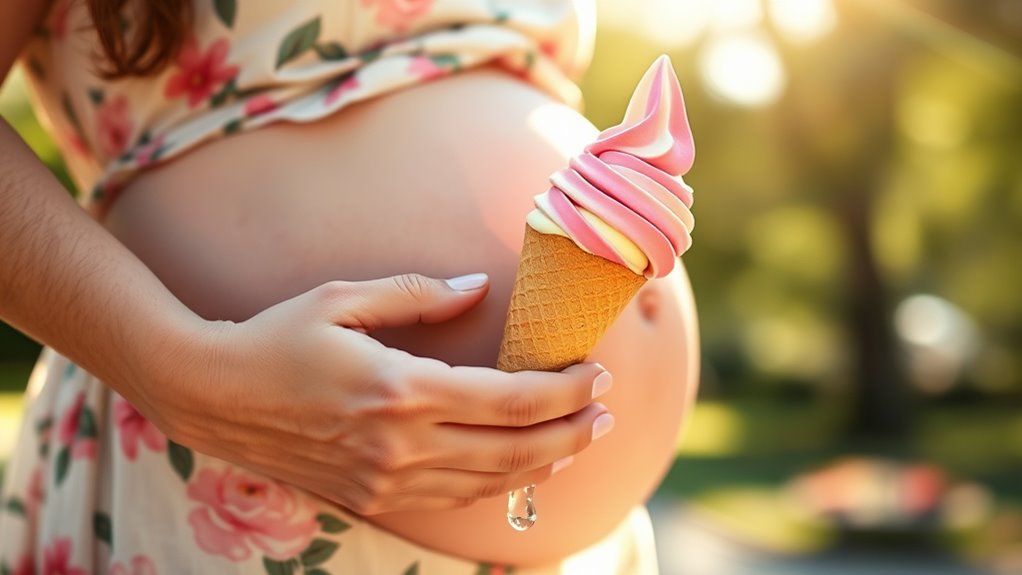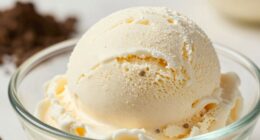You can safely enjoy ice cream during pregnancy if you choose brands made with pasteurized ingredients. Store-bought options, like Ben & Jerry’s, are usually fine, but avoid homemade recipes with raw eggs. Remember that while ice cream offers some calcium, moderation is key to prevent excess weight gain. It’s important to balance treats with nutrient-dense foods. Curious about specific cravings or flavors to avoid? There’s more to discover.
Key Takeaways
- Store-bought ice cream is generally safe during pregnancy if made with pasteurized ingredients, like those from brands such as Ben & Jerry’s.
- Cravings for ice cream may indicate increased calcium needs, as pregnant women require about 1,000 mg of calcium daily.
- Moderation is essential when consuming ice cream, as it is high in added sugars and calories, with a pint containing up to 1,000 calories.
- Avoid ice cream flavors with raw or partially cooked eggs and check for any unpasteurized dairy products to ensure safety.
- Enjoy ice cream as an occasional treat, balancing it with nutrient-dense foods and monitoring portion sizes to avoid excessive calorie intake.
Safety of Ice Cream During Pregnancy
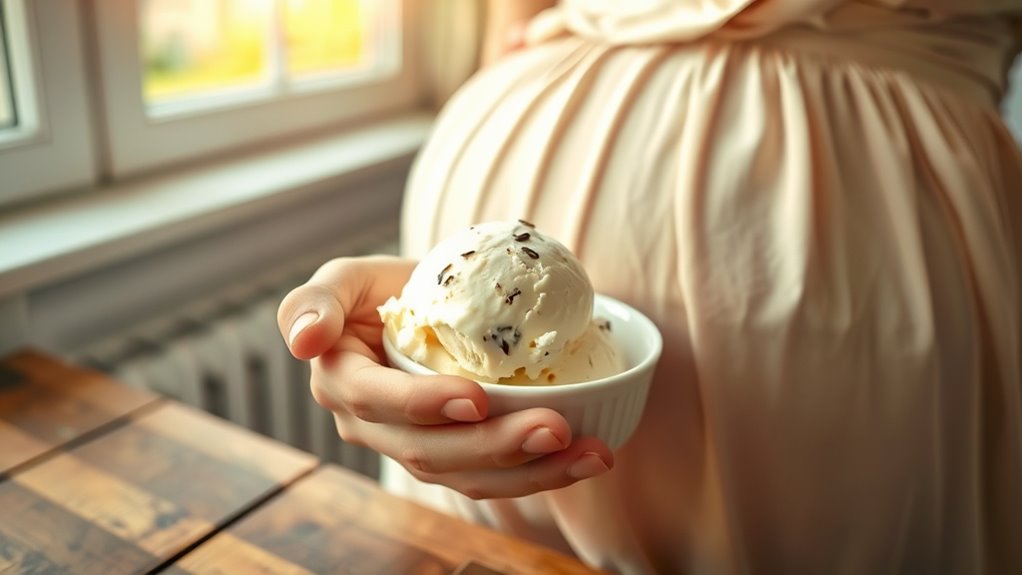
When you’re pregnant, enjoying ice cream can be a delightful treat, as long as you choose wisely.
Most store-bought ice cream, especially brands like Ben & Jerry’s, is safe to eat since they use pasteurized milk and cream. You can indulge in flavors with cookie dough or brownie batter chunks, as they contain pasteurized eggs, lowering the risk of salmonella.
Soft-serve ice cream is also safe if made with pasteurized ingredients. However, be cautious with homemade versions that might’ve raw eggs.
While satisfying those pregnancy cravings, remember to enjoy ice cream in moderation due to its high sugar and calorie content.
With smart choices, you can savor this sweet treat without worry.
Understanding Pregnancy Cravings

During pregnancy, your hormones are in overdrive, which can lead to some surprising food cravings.
These cravings often reflect your body’s increased nutritional needs, like a desire for more protein or calcium.
Understanding what your body is asking for can help you make healthier choices while still enjoying the occasional treat.
Hormonal Changes Impact Cravings
Pregnancy often brings about significant hormonal changes that can lead to intense food cravings and aversions. These hormonal surges can kick in as early as the first few weeks, making you crave specific foods, especially dairy products.
As your body adjusts to new nutritional needs, cravings for high-calorie foods, like ice cream, may intensify, especially since you typically need about 300 extra calories daily.
It’s not uncommon to find yourself wanting unusual combinations, like pickle sandwiches or Hot Cheetos with yogurt. While indulging in these cravings can be tempting, it’s wise to consult your healthcare provider if your cravings seem excessive or involve non-food items, as they could indicate potential nutritional deficiencies. Additionally, understanding the key domains of development can help you make informed choices about your dietary needs during this crucial time.
Nutritional Needs and Cravings
As your body undergoes changes to support your growing baby, you may find yourself experiencing specific cravings that reflect your nutritional needs.
These food cravings often stem from hormonal shifts and may indicate your body’s demand for certain nutrients. It’s crucial to indulge occasionally, but keep your meals balanced. Aim for around 300 extra calories daily, focusing on healthy choices.
- Cravings for protein-rich foods like meat and dairy can signify a need for iron and calcium.
- Fruits and veggies can satisfy sweet cravings while providing essential vitamins.
- Whole grains are great for energy and fiber.
- If you crave non-food items, it’s important to consult your healthcare provider.
Listening to your cravings can help you nourish both yourself and your baby!
Common Weird Cravings
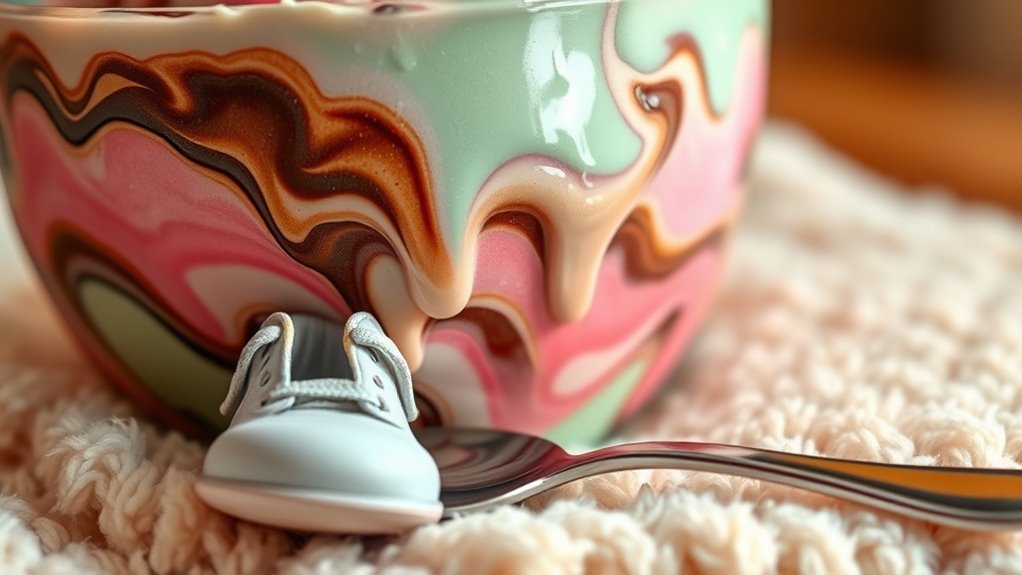
You might find yourself craving some pretty strange food combinations during pregnancy, like pickle sandwiches or Hot Cheetos with yogurt.
These cravings can sometimes point to nutritional deficiencies, especially if they lead to pica, which involves eating non-food items and can be risky for both you and your baby.
Understanding these cravings is key to ensuring you and your little one stay healthy.
Unusual Food Combinations
Many pregnant women find themselves craving unusual food combinations that might seem bizarre to others. These cravings can reflect hormonal changes or nutritional needs, often leading to surprising pairings.
You might find yourself reaching for:
- Ice cream with pickles
- Hot Cheetos dipped in yogurt
- Peanut butter and bacon sandwiches
- Cold fruit salad topped with chili powder
These combinations, while strange, can satisfy your cravings and provide essential nutrients for you and your baby. It’s important to be mindful of your cravings, especially since excessive consumption of high sugar and fat content can lead to health concerns for you and your baby.
It’s important to listen to your body and understand what these cravings might signify. If you experience any non-food cravings, like chalk or dirt, it’s best to consult your healthcare provider.
Embrace these quirky cravings; they’re part of your unique pregnancy journey!
Nutritional Deficiencies Indicator
Cravings during pregnancy can sometimes point to nutritional deficiencies, revealing what your body might need. For instance, a strong desire for ice creams could indicate a calcium deficiency, vital for your baby’s bone development. Other cravings, like protein-rich foods, signal your body’s need for more iron to support increased blood volume. It’s important to be aware of your body’s signals, as early detection of deficiencies can help ensure a healthy pregnancy.
| Craving Type | Nutritional Deficiency |
|---|---|
| Ice Cream | Calcium |
| Red Meat/Eggs | Iron |
| Dairy Products | Calcium |
If you find yourself craving non-food items or unusual food combinations, it’s important to consult a healthcare professional. They can help identify underlying issues and guarantee you meet your nutritional needs during this important time.
Pica and Health Risks
While some pregnant individuals experience typical cravings for foods like ice cream, others may face a more concerning issue known as pica, which involves an intense desire to consume non-food items such as dirt or paint chips.
This condition can signal nutritional deficiencies, particularly iron, and poses serious health risks to your baby. It’s vital to consult your healthcare provider if you experience these cravings.
- Pica can lead to infections.
- It may cause gastrointestinal blockages.
- There’s a risk of poisoning from harmful substances.
- Addressing pica can guarantee you receive proper nutritional support.
Recognizing pica is important to avoiding potential health hazards and guaranteeing both you and your baby remain healthy throughout your pregnancy.
Store-Bought Ice Cream
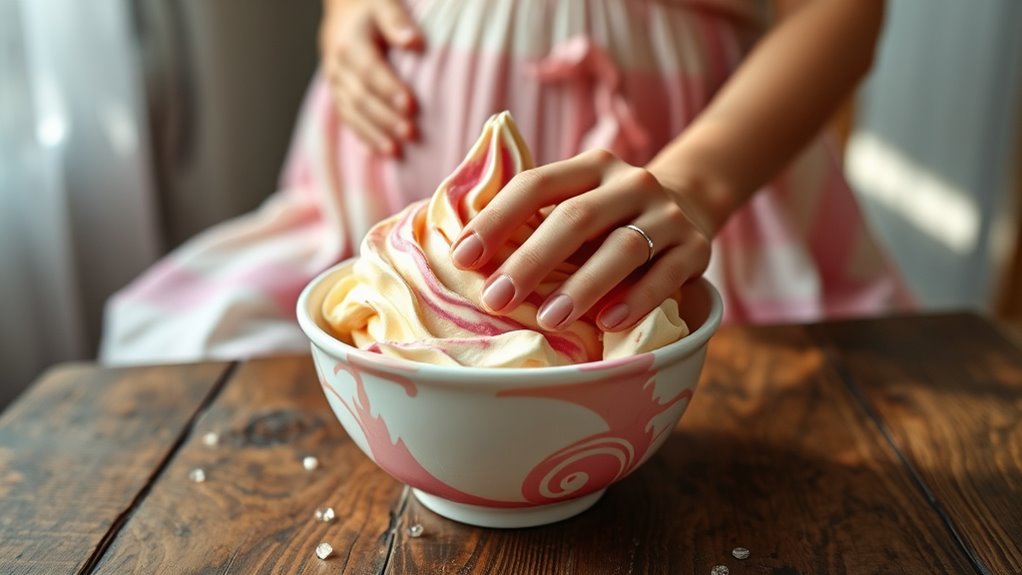
When you’re pregnant, indulging in store-bought ice cream can be a delightful treat, especially since it’s typically made with pasteurized ingredients that minimize the risk of foodborne illnesses. Brands like Ben & Jerry’s use pasteurized eggs in their cookie dough and brownie batter, ensuring safety for your cravings. However, be cautious and avoid flavors containing raw eggs or unpasteurized ingredients. Here’s a quick reference to keep in mind:
| Flavor | Pasteurized Ingredients | Safe to Eat |
|---|---|---|
| Cookie Dough | Yes | Yes |
| Rocky Road | Yes | Yes |
| Mint Chocolate Chip | Yes | Yes |
| Homemade Vanilla | No | No |
| Strawberry Swirl | Yes | Yes |
Enjoying store-bought ice cream in moderation can satisfy those cravings while being mindful of portion sizes! Additionally, it’s important to remember that herbal teas may also provide comfort and relaxation during pregnancy, complementing your sweet treats. Consuming juices rich in vitamins can also support overall health during this special time.
Homemade Ice Cream
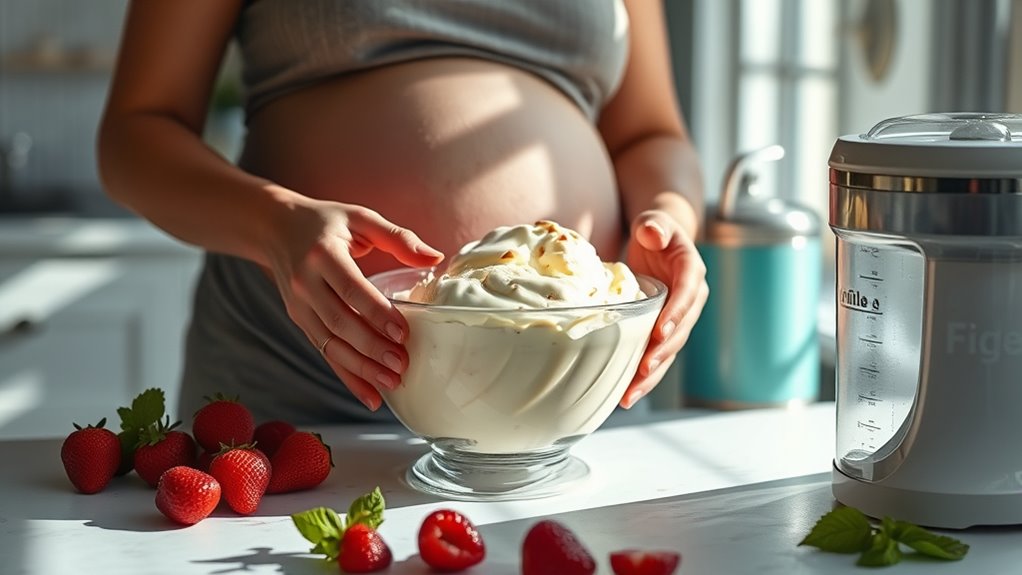
Making homemade ice cream can be a fun and rewarding way to satisfy your sweet tooth during pregnancy, but it comes with specific safety considerations. To enjoy your treat without worry, follow these guidelines:
- Use pasteurized milk and cream to reduce the risk of food poisoning.
- Avoid recipes that include raw eggs, as they can lead to salmonella.
- Thoroughly cook any ingredients that need cooking; steer clear of raw and undercooked meat.
- Opt for fruit purees or safe flavorings to create delicious flavors while adhering to dietary recommendations.
Flavors to Avoid
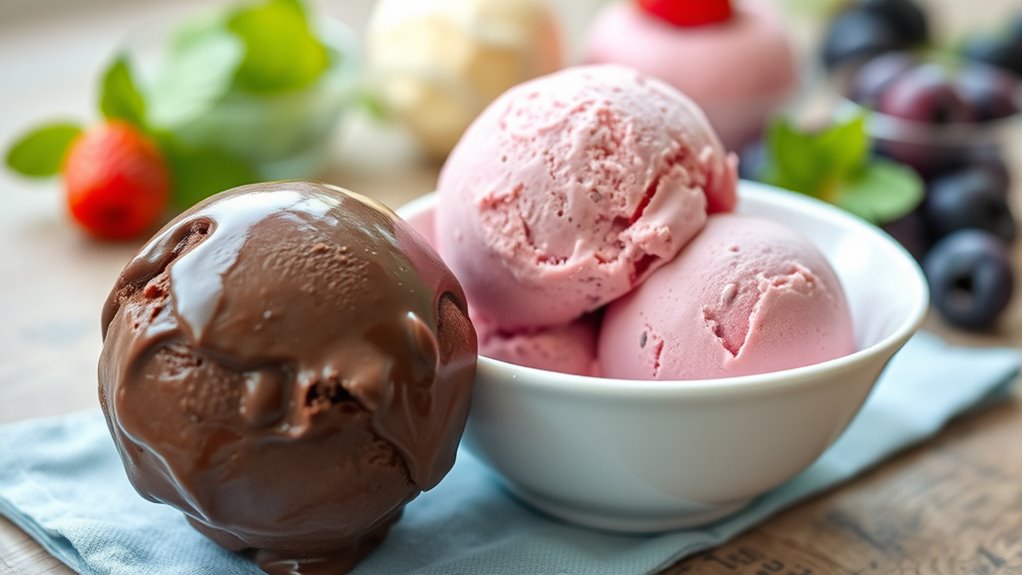
Certain ice cream flavors can pose health risks during pregnancy, so it’s crucial to choose wisely.
Pregnant women should avoid any flavors containing raw or partially cooked eggs, as these can lead to salmonella food poisoning. Additionally, flavors that are cold-smoked or cured need to be heated until steaming hot to eliminate harmful bacteria, like listeriosis.
Be cautious of high-caffeine flavors, as excessive caffeine isn’t recommended during pregnancy. Check labels carefully for alcohol-based extracts, and steer clear of any ice cream made with unpasteurized dairy products, which can threaten both you and your baby.
Importance of Moderation

While ice cream can be a delightful treat during pregnancy, enjoying it in moderation is essential for your health and that of your baby. Overindulgence can lead to unwanted weight gain and health complications, such as gestational diabetes.
Remember, a typical pint of ice cream may contain up to 1,000 calories, so portion control is key. Aim to balance your diet with healthier options while still savoring a scoop now and then.
Here are some tips to keep in mind:
- Opt for smaller servings to manage calorie intake.
- Choose ice creams with healthy fats and lower sugar levels.
- Enjoy ice cream as an occasional treat, not a daily habit.
- Stay mindful of your overall caloric needs during pregnancy.
Nutritional Considerations
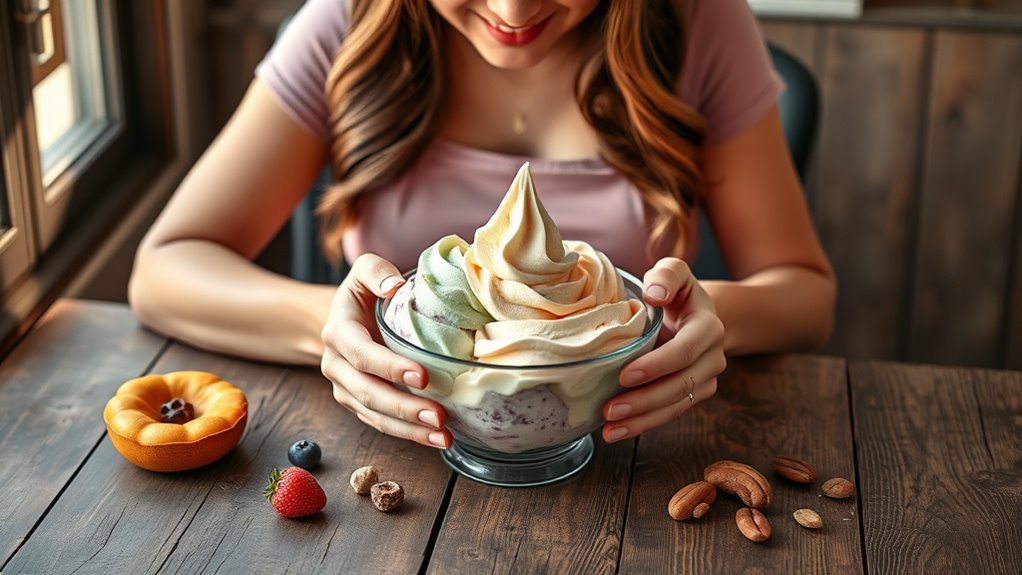
Enjoying ice cream during pregnancy can offer some nutritional benefits, particularly as a source of calcium.
Pregnant women need about 1,000 mg of calcium daily for ideal bone health for both you and your baby. While ice cream does provide essential nutrients, it’s high in added sugars and calories, so moderation is key to preventing excessive weight gain.
Indulging in ice cream occasionally is fine, but remember it shouldn’t replace more nutrient-dense foods that supply proteins, vitamins, and minerals vital for fetal development.
Those cravings for dairy may indicate your body’s need for extra calcium to support your baby’s growing bones and teeth.
Aim for a balanced diet that includes a variety of food groups, enjoying ice cream as a treat.
Recommendations for Enjoying Ice Cream

How can you satisfy your ice cream cravings during pregnancy without compromising your health? It’s all about making smart choices.
Enjoy ice cream as an occasional treat rather than a daily indulgence to manage your calorie intake. When you do indulge, opt for brands like Ben & Jerry’s that use pasteurized milk and eggs, ensuring it’s safe for you and your baby.
Keep an eye on portion sizes to avoid excessive calories, and remember that ice cream shouldn’t be your primary source of calcium.
Finally, steer clear of flavors with caffeine or alcohol during pregnancy.
- Choose pasteurized brands
- Monitor portion sizes
- Consider calcium alternatives
- Avoid caffeinated or alcoholic flavors
Frequently Asked Questions
Is It Okay to Eat Ice Cream While Pregnant?
Yes, you can enjoy ice cream, but moderation is key.
It’s important to guarantee it’s made with pasteurized ingredients to avoid any foodborne illnesses. While indulging in a scoop now and then is fine, keep an eye on your overall diet.
Balancing treats with nutrient-rich foods will help you meet your needs. Remember, satisfying cravings is great, but staying mindful of sugar and calorie intake is essential for your health and well-being.
What to Avoid in Pregnancy in the First Trimester?
Did you know that around 20% of foodborne illnesses come from raw or undercooked foods?
During the first trimester, you should avoid raw or undercooked meat, unpasteurized dairy products, and raw eggs unless they’re properly sourced.
High-dose vitamin A supplements and alcohol are also off-limits.
These precautions help minimize risks to your baby’s development and guarantee a healthier pregnancy.
Stay informed and make safe choices for you and your little one!
Why Am I Craving Ice Cream While Pregnant?
You might crave ice cream due to hormonal changes and your body’s increased nutritional needs.
As you go through this exciting time, your cravings can reflect a desire for comfort and satisfaction. Ice cream’s creamy texture and variety of flavors can be hard to resist!
Plus, your body may be signaling a need for extra calories, making it perfectly natural to seek out this delicious treat now and then.
Just remember to balance it with healthy choices!
Can You Have Shop Bought Ice Cream When Pregnant?
Yes, you can have shop-bought ice cream when pregnant, but you should be cautious.
You’ll want to check for pasteurized ingredients, avoid flavors with raw eggs, and keep an eye on added sugars and allergens.
You can indulge in a treat, you can satisfy cravings, and you can still maintain a balanced diet.
If you notice any unusual symptoms afterward, reach out to your healthcare provider for guidance.
Enjoy responsibly!
Conclusion
To summarize, indulging in ice cream during pregnancy can be safe and satisfying if you keep a few things in mind. Embrace those cravings, but remember to choose wisely and enjoy in moderation. Avoid certain flavors that might pose risks, and consider making your own for a healthier twist. By balancing your desires with nutritional choices, you can savor every scoop guilt-free. So go ahead, treat yourself—you deserve it!
